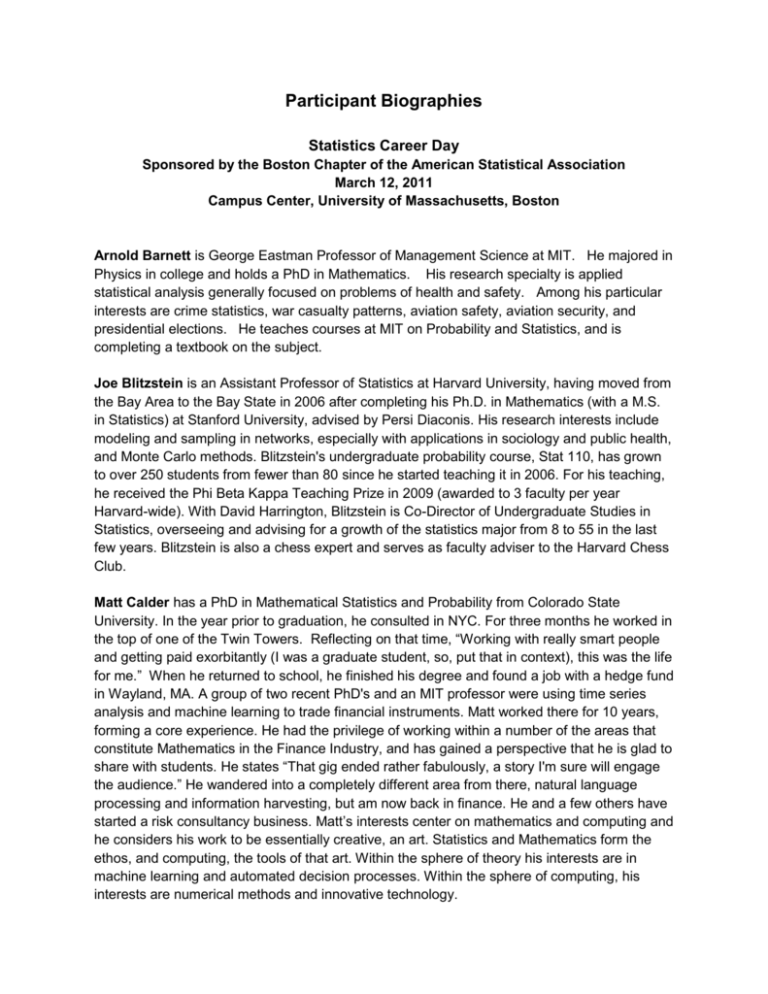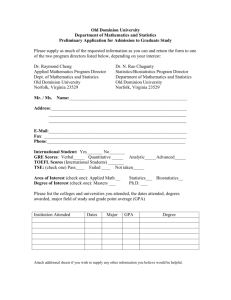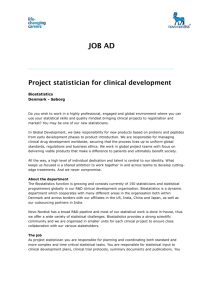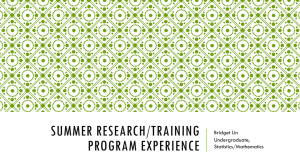Participants' Biographies - American Statistical Association
advertisement

Participant Biographies Statistics Career Day Sponsored by the Boston Chapter of the American Statistical Association March 12, 2011 Campus Center, University of Massachusetts, Boston Arnold Barnett is George Eastman Professor of Management Science at MIT. He majored in Physics in college and holds a PhD in Mathematics. His research specialty is applied statistical analysis generally focused on problems of health and safety. Among his particular interests are crime statistics, war casualty patterns, aviation safety, aviation security, and presidential elections. He teaches courses at MIT on Probability and Statistics, and is completing a textbook on the subject. Joe Blitzstein is an Assistant Professor of Statistics at Harvard University, having moved from the Bay Area to the Bay State in 2006 after completing his Ph.D. in Mathematics (with a M.S. in Statistics) at Stanford University, advised by Persi Diaconis. His research interests include modeling and sampling in networks, especially with applications in sociology and public health, and Monte Carlo methods. Blitzstein's undergraduate probability course, Stat 110, has grown to over 250 students from fewer than 80 since he started teaching it in 2006. For his teaching, he received the Phi Beta Kappa Teaching Prize in 2009 (awarded to 3 faculty per year Harvard-wide). With David Harrington, Blitzstein is Co-Director of Undergraduate Studies in Statistics, overseeing and advising for a growth of the statistics major from 8 to 55 in the last few years. Blitzstein is also a chess expert and serves as faculty adviser to the Harvard Chess Club. Matt Calder has a PhD in Mathematical Statistics and Probability from Colorado State University. In the year prior to graduation, he consulted in NYC. For three months he worked in the top of one of the Twin Towers. Reflecting on that time, “Working with really smart people and getting paid exorbitantly (I was a graduate student, so, put that in context), this was the life for me.” When he returned to school, he finished his degree and found a job with a hedge fund in Wayland, MA. A group of two recent PhD's and an MIT professor were using time series analysis and machine learning to trade financial instruments. Matt worked there for 10 years, forming a core experience. He had the privilege of working within a number of the areas that constitute Mathematics in the Finance Industry, and has gained a perspective that he is glad to share with students. He states “That gig ended rather fabulously, a story I'm sure will engage the audience.” He wandered into a completely different area from there, natural language processing and information harvesting, but am now back in finance. He and a few others have started a risk consultancy business. Matt’s interests center on mathematics and computing and he considers his work to be essentially creative, an art. Statistics and Mathematics form the ethos, and computing, the tools of that art. Within the sphere of theory his interests are in machine learning and automated decision processes. Within the sphere of computing, his interests are numerical methods and innovative technology. Steven Correia works for the Massachusetts Division of Marine Fisheries and currently supervises the Survey and Assessment program of the Massachusetts Division of Marine Fisheries. His program is responsible for conducting fisheries independent surveys and provides technical support for in the development and evaluation of options for managing our fisheries. Interests include analyzing time series of trawl survey data, estimating demographic changes in fish populations, designing experiments and analyzing the biological and economic impacts of management measures in the fisheries. Steven trained as a marine biologist for his undergraduate degree and worked on differentiating species of tapeworms based on hook morphology. His favorite part of the job is working on a variety of problems that encompass many fields and working with many people. In the past three months, he has developed estimates of abundance, sex ratios, and size structure of horseshoe crabs, designed and analyzed a bacteriological laboratory proficiency study, estimated survival rates in several smelt populations, examined changes in the geographic and depth distribution of finfish in Massachusetts Bay and he has analyzed a time series of white shark sightings data. After more than 26 years on the job, he is still thrilled when he finds the unexpected in a batch of data. Mark Glickman is Associate Professor in the Health Policy and Management department at the Boston University School of Public Health, and Senior Statistician at the Center for Health Quality, Outcomes and Economics Research, a Veterans Administration Center of Excellence. Mark received his bachelor's degree in Statistics from Princeton University in 1986, and his doctoral degree in Statistics in 1993 from Harvard University. He is well-known for inventing several rating systems for competitors in games and sports. Mark has had a long-standing interest in the application of statistical methods to rating tournament chess players, and has been chair of the U.S. Chess Federation's Ratings Committee for over 15 years. He has cofounded and co-organized the New England Symposia on Statistics in Sports (NESSIS) held at Harvard University in 2007 and 2009, and will co-organize the 2011 NESSIS as well. Additionally, Mark is interested in statistical applications to health services problems, with recent interest in measuring the effects of varying medication prescription adherence to health outcomes. Mark is also the editor of the "Here's to your Health" column in Chance magazine. Alane Izu is a current PhD student in the Department of Biostatistics at Harvard University. Her doctoral dissertation focuses on Bayesian methods of identifying and comparing branching tree structures that can be applied to modeling the development of resistant Tuberculosis (TB) strains. Before starting her dissertation, she received a B.S. in Statistics from BYU and a Master’s degree in Biostatistics at Harvard University. She then returned to San Jose, where she worked as a substitute teacher for the local High School district. After a period of time, she had the opportunity to use her statistical knowledge working as an intern for Novartis Pharmaceuticals in Switzerland. Her favorite pastime is playing soccer. She also has a passion for teaching. Joseph Massaro received his BA in Mathematics in 1985 from Boston College, then his M.A. and Ph.D. in Mathematics in 1989 and 1994 from Boston University. His Ph.D. work focused on statistical analyses. In 1986, while in his first year of graduate school, he worked in data entry for 2 years in the biotech industry, and then in 1988 found a job as a statistical programmer at Quintiles, a company providing clinical trial services to the pharmaceutical industry, while working on his Ph.D. After receiving his Ph.D. he was promoted to Senior Biostatistician and eventually Associate Director of Statistics and Data Management at Quintiles. In 1998, he left Quintiles to join Boston University where he is currently Associate Professor of Biostatistics, focusing on teaching courses in clinical trials, while also still serving as an independent statistical consultant to the biotech, pharma and medical device industries. As part of his duties at BU, he is also a statistician on the Framingham Heart Study. Sachiko Miyahara is originally from Japan and received B.A. and M.S. in Statistics from the University of Connecticut. During the junior year at the university, she had to select her major. She went through the list of departments, eliminated all social science majors (due to her poor English), eliminated all hard core science majors, and only mathematics and statistics were left. Since she thought mathematics was scary, she chose statistics as a major. At that time she did not know, but later she realized it was a very smart choice. Currently, she is happily working as a senior statistician at Harvard School of Public Health after receiving PhD in Biostatistics at University of Pittsburgh. Katherine Monti earned her BA in Mathematics at Oberlin College and her PhD in Biostatistics in the School of Public Health at the University of North Carolina at Chapel Hill. Following graduation she joined the faculty in the Mathematics, Statistics, and Computer Science Department at the University of Missouri-St. Louis. Three years later she went to work at Ralston Purina Company, working half time while she raised her sons. Thirteen years later she moved with her family to Boston, where she has worked for Ciba Corning Diagnostics (now owned by Bayer), Astra Pharmaceuticals (now Astra Zeneca), and Rho, Inc. Rho is a consulting company serving large and small clients in the pharmaceutical and biotech industry. Dr. Monti has also participated in professional service activities as Secretary then President of the Boston Chapter of the American Statistical Association, Chair of the ASA's Advisory Committee for Continuing Education (the committee that organizes short courses at the annual statistics meetings), a member of the Board of Directors of the ASA, as Chair and other roles for the Biopharmaceutical Section of the ASA, and in various other capacities. Lisa Sullivan has a PhD in Statistics and is Professor and Chair of the Department of Biostatistics at the Boston University School of Public Health. She is also Associate Dean for Education. She teaches Elementary Biostatistics for MPH students and lectures in biostatistical methods for clinical researchers. Lisa is the Principal Investigator of the National Heart, Lung, and Blood’s Summer Institute for Training in Biostatistics, which is designed to promote interest in the field of biostatistics and to expose students to the many exciting career opportunities available to them. Lisa is the recipient of numerous teaching awards, including the Norman A. Scotch award and the prestigious Metcalf Award, both for excellence in teaching at Boston University. In 2008 she won the Associations for Schools of Public Health/Pfizer Excellence in Teaching Award. Lisa is also a biostatistician on the Framingham Heart Study working primarily in developing and disseminating cardiovascular risk functions. She is active in several large-scale epidemiological studies for adverse pregnancy outcomes and in multidisciplinary research projects in prenatal diagnosis, obstetrics, autism, cardiovascular disease, and emergency medicine. She has published two books: Essentials of Biostatistics in Public Health (currently in its second edition), and Introductory Applied Biostatistics. Her work has also resulted in over 160 peer-reviewed publications.





